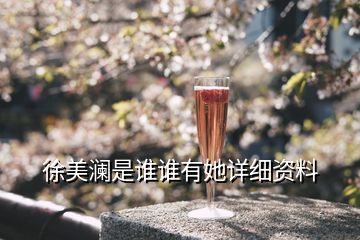1,王文韶的5个儿子简介
王文韶有5个儿子,大儿子的一个子孙名叫王敦厚,现在杭州。浙江省林科院里一块王文韶原配夫人墓的墓碑,碑上写着“皇清诰封一品夫人元配钱夫人之墓……光绪十一年乙酉十二月吉日治葬……”

2,徐美澜是谁谁有她详细资料
一个很好听的女歌手,爱听她的歌的人一起来创建,如果她本人见了,有不对的地方,改正就可以了。
专辑名称:月朦胧
专辑视听地址: http://www.ting789.com/musiclist/mmc_7357.htm
专辑简介:
暂无
歌曲详细列表
————————————————————————
1:《金枝欲孽 - 咏叹调》2:《秋天不回来》3:《爱情》4:《慢慢的》5:《月朦胧鸟朦胧》
6:《生日礼物》7:《你的肩是我今生的天》8:《离歌》9:《女人花》10:《葬心》
11:《故乡的云》12:《尘缘》13:《念亲恩》
我不认识她额 、不好意思啊~~~
不好意思 我找遍了 我所知道的搜索网 都没她 不好意思啊
即是歌手,又是影视明星
还有《飞蛾扑火》《心在跳情在烧》很优秀的人
是个女的,很伟大!

3,济尔哈朗的儿子介绍
情,能烧掉整整一个冬天.@@总有一天她们老了,成为烛光里的妈妈,儿女们除了爱的回报,还能做什么呢?@@师:如果说因为忙碌和粗心,我们忽略了平时对母亲的问候和关心,无论如何,别忘了母亲节这天,买上一束康乃馨,或者哪怕只是一句祝福,送给你的妈妈…@@@生甲:我们要宽谅妈妈的时代缺陷.如果母亲在我们眼里看上去不合时宜,也不该嘲笑她.因为是她的时代塑造了她,正如我们的时代塑造了大家.@@生乙:我们要做妈妈耐心的倾听者.因为妈妈的唠叨,大多是出于她对我们的责任心和深深的爱.@@生丙:我们要让自己走得更稳当.妈妈常常是无私的,我们的快乐与成功,往往就是她的快乐与成功.为此,我们要
是努尔哈赤的养子。 爱新觉罗·济尔哈朗(1599-1655),和硕庄亲王爱新觉罗·舒尔哈齐第六子;己亥年十月初二日丑时生,母为舒尔哈齐五娶福晋乌喇纳喇氏,布干贝勒之女;顺治十二年乙未五月初八日(1655年6月11日)寅时薨,年五十七岁。济尔哈朗自小就生活在努尔哈赤的宫中,由努尔哈赤加以抚养,所以他与努尔哈赤的儿子们关系很好,尤其是与皇太极的关系更是非同一般,这样他才会在父兄反叛后依旧受到信任和重用。济尔哈朗从青年时代起就追随努尔哈赤南征北讨,因军功受封为和硕贝勒。是努尔哈赤时期共柄国政的八大和硕贝勒之一,也是皇太极时代四大亲王之一。成为清朝历史上惟一一位受“叔王”封号的人。后入享太庙。

4,杞人忧天 作者 简介
“杞人忧天”出自《列子》,作者是列子。列子(大约公元前450年—公元前375年即战国年间,享年75岁),战国前期道家代表人物。名寇,又名御寇(“列子”是后人对他的尊称),华夏族,周朝郑国圃田(今河南省郑州市)人,古帝王列山氏之后。先秦天下十豪之一,著名的 道学者 思想家、哲学家、文学家、教育家。列子,战国前期思想家,是老子和庄子之外的又一位道家思想代表人物,与郑缪公同时。其学本于黄帝老子,主张清静无为。对后世哲学、美学、文学、科技、养生、乐曲、宗教影响非常深远。著有《列子》,其学说本于黄帝老子,归同于老、庄。创立了先秦哲学学派贵虚学派(列子学)。是介于老子与庄子之间道家学派承前启后的重要传承人物。扩展资料:列子著作介绍:《列子》又名《冲虚真经》 。是战国早期列子、列子弟子以及其后学所著,到了汉代出现以后,便尊之为《冲虚真经》,且封列子为冲虚真人,其学说被古人誉为常胜之道。是中国古代先秦思想文化史上著名的典籍,属于诸子学派著作,是一部智慧之书,它能开启人们心智,给人以启示,给人以智慧。其书默察造化消息之运,发扬黄老之幽隐,简劲宠妙,辞旨纵横,是道家义理不可或缺的部分。唐天宝元年,唐玄宗下旨设“玄学博士”,诏告《列子》为《冲虚真经》,北宋加封为“至德”,号曰《冲虚至德真经》。列为道教的重要经典之一。参考资料来源:搜狗百科——杞人忧天参考资料来源:搜狗百科——列子
杞人忧天 作者:列子【出自】:《列子·天瑞》:“杞国有人,忧天地崩坠,身亡所寄,废寝食者。”简介 从前在杞国,有一个胆子很小,而且有点神经质的人,他常会想到一些奇怪的问题,而让人觉得莫名其妙。有一天,他吃过晚饭以后,拿了一把大蒲扇,坐在门前乘凉,并且自言自语地说:“假如有一天,天塌了下来,那该怎么办呢?我们岂不是无路可逃,而将活活地被压死,这不就太冤枉了吗?” 从此以后,他几乎每天为这个问题发愁、烦恼,朋友见他终日精神恍惚,脸色憔悴,都很替他担心,但是,当大家知道原因后,都跑来劝他说:“老兄啊!你何必为这件事自寻烦恼呢?天空怎么会塌下来呢?再说即使真地塌下来,那也不是你一个人忧虑发愁就可以解决的啊,想开点吧!”可是,无论人家怎么说,他都不相信,仍然时常为这个不必要的问题担忧。后来的人就根据上面这个故事,引伸成“杞人忧天”这句成语,它的主要意义在唤醒人们不要为一些不切实际的事情而忧愁。它与“庸人自扰”的意义大致相同。
杞人忧天 从前在杞国,有一个胆子很小,而且有点神经质的人,他常会想到一些奇怪的问题,而 让人觉得莫名其妙。 有一天,他吃过晚饭以后,拿了一把大蒲扇,坐在门前乘凉,并且自言自语的说:“假如有一天,天塌了下来,那该怎么办呢?我们岂不是无路可逃,而将活活地被压 死,这不就太冤枉了吗?” 从此以后,他几乎每天为这个问题发愁、烦恼,朋友见他终日精神恍惚,脸色憔悴,都 很替他担心,但是,当大家知道原因后,都跑来劝他说: “老兄啊!你何必为这件事自寻烦恼呢?天空怎么会塌下来呢?在说即使真的塌下来, 那也不是你一个人忧虑发愁就可以解决的啊,想开点吧!” 可是,无论人家怎么说,他都不相信,仍然时常为这个不必要的问题担忧。 后来这个故事,被人们引伸成“杞人忧天”这句成语。比喻庸人自扰,毫无根据地瞎担心。人们也经常用这个成语告戒别人,不要为一些不切实际的事情而忧愁。它与“庸人自扰”的意义大致相同。另:出自〈列子〉的典故: 杞国有人忧天地崩坠①,身无所寄②,废寝食者。又有忧彼之所忧者③,因往晓之,曰④:“天,积气耳,无处无气⑤。若屈伸呼吸⑥,终日在天中行止⑦,奈何忧崩坠乎?” 其人曰:“天果积气⑧,日月星宿,不当坠乎⑨?”晓之者曰:“日月星宿,亦积气中之有光耀者,只使坠⑩,亦不能有所中伤(11)。”其人曰:“奈地坏何(12)?”晓者曰:“地积块耳(13),充塞四虚(14),无处无块。若躇步跐蹈(15),终日在地上行止,奈何忧其坏?”其人舍然大喜(16),晓之者亦舍然大喜。——《列子》编辑本段【注释】 ①崩坠——崩塌,坠落。 ②身亡所寄——没有地方存身。亡,同“无”。寄,依附,依托。 ③又有忧彼之所忧者——又有一个为他的忧愁而担心的人。 ④晓——开导。 ⑤无处无气——没有一处没有气。 ⑥若——你。屈伸——身体四肢的活动。 ⑦终日在天中行止——整天在天空气体里活动。行止,行动和停留。 ⑧果——果然,果真。 ⑨日月星宿(xiù)不当坠耶——日月星辰不就会坠落下来了吗?星宿,泛指星辰。 ⑩只使——即使。 (11)中伤——打中击伤。 (12)奈地坏何——那地坏了(又)怎么办呢? (13)地积块耳——大地是土块堆积成的罢了。 (14)四虚——四方。 (15)躇(chú)步跐(cí)蹈——泛指人的站立行走。躇,立。步,走。跐,踩。蹈,踏。 (16)舍然——释然,放心的样子。 杞国有一个人,整天吃不好饭,睡不着觉,满脸忧愁的神色。 他的一个朋友为他担忧,关切地问:“你有什么忧愁的事吗?” 这个人叹了口气说:“唉!我担心天会突然塌下来,地会突然陷下去,我的身体到哪里去躲藏呢?” 他的朋友就开导他说:“天,不过是一团气积聚起来的,没有一个地方没有气,你伸展身体、俯仰、呼吸,每时每刻都在天中活动,你 为什么还担忧天会塌下来呢?” 这个人又说:“这天如果真的是一团气积聚起来的,那天上的日月星辰,不是都要掉下来了吗?” 他的朋友又劝导说:“日月星辰,只是那一团气体中有光耀的一部分,即使掉下来,也不会伤害人的。” 这个人又追问:“那么,地陷了,人又怎么办呢?” 他的朋友又说:“地,也不过是堆积起来的土块,它塞满了四面八方所有空虚的地方,没有一个地方没有土块,你跨步、跳跃,每时每 刻都在地上活动,为什么还要担忧地会陷下去呢?” 这个人听后,放心下来,高兴极了。开导他的人也放心下来,高兴极了。
凤飞飞
5,求Deciduous的简介
Deciduous
In botany and horticulture, deciduous plants, including trees, shrubs and herbaceous perennials, are those that lose all of their leaves for part of the year. This process is called abscission. In some cases the leaf loss coincides with winter - namely in temperate or polar climates. While in other areas of the world, plants lose their leaves during the dry season or during other seasonal variations in rainfall, including tropical and subtropical areas of the world.
The converse of deciduous is evergreen; plants that are intermediate may be called semi-deciduous. Some tree, including a few Oak species have desiccated leaves that remain on the tree through winter; these dry persistent leaves are called marcescent leaves and are dropped in the spring as new growth begins.
Like many deciduous plants, Forsythia flowers during the leafless season
Many deciduous plants flower during the period when they are leafless, as this increases the effectiveness of pollination. The absence of leaves improves wind transmission of pollen in the case of wind-pollinated plants, and increases the visibility of the flowers to insects in insect-pollinated plants. This strategy is not without risks, as the flowers can be damaged by frost, or in dry season areas, result in water stress on the plant. Nevertheless, by losing leaves in the cold winter days, plants can reduce water loss since most of the water would appear as ice, and there is much less branch and trunk breakage from glaze ice storms when leafless.
Leaf drop or abscission involves complex physiological signals and changes within plants. The process of photosynthesis steadily degrades the supply of chlorophylls in foliage; plants normally replenish chlorophylls during the summer months. When days grow short and nights are cool, or when plants are drought stressed, deciduous trees decrease chlorophyll pigment production allowing other pigments present in the leaf to become apparent, resulting in fall color. These other pigments include carotenoids that are yellow, brown, and orange. Anthocyanin pigments produce reds and purple colors, though they are not always present in the leaves but are produced in the foliage in late summer when sugars are trapped in the leaves after the process of abscission begins. Parts of the world that have showy displays of bright fall colors are limited to locations where days become short and nights are cool. In other parts of the world the leaves of deciduous trees simply fall off without turning the bright colors produced from the accumulation of anthocyanin pigments.
The beginning of leaf drop starts when an abscission layer is formed between the leaf petiole and the stem. This layer is formed in the spring during active new growth of the leaf, it consists of layers of cells that can separate from each other. The cells are sensitive to a plant hormone called auxin that is produced by the leaf and other parts of the plant. When the auxin coming from the leaf is produced at a rate consistent with that of the auxin from the body of the plant, the cells of the abscission layer remain connected; in the fall or when under stress the auxin flow from the leaf decreases or stops triggering cellular elongation within the abscission layer. The elongation of these cells break the connection between the different cell layers, allowing the leaf to break away from the plant, it also forms a layer that seals the break so the plant does not lose sap.
A number of deciduous plants remove nitrogen and carbon from the foliage before they are shed and store them in the form of proteins in the vacuoles of parenchyma cells in the roots and the inner bark. In the spring these proteins are used as a nitrogen source during the growth of new leaves or flowers.[3]
Plants with deciduous foliage compared to plants with evergreen foliage, have both advantages and disadvantages in growth and competition for space. Since deciduous plants lose their leaves to conserve water or to better survive winter weather conditions, they must regrow new foliage when the next growing season is suitable, this uses more resources which evergreens do not need to expend.